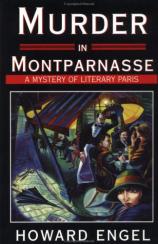Murder in Montparnasse
Review
Murder in Montparnasse
"In a way, Paris is like an island. You may see a whispered exchange across the floor. There's no need to bend an ear or move closer. Someone will tell you what was going on before the week is over. That's the way it is in an expatriate community."
And there's no question that gossip is abundant among the party-hard characters in the bustling cafés of Howard Engel's Paris. MURDER IN MONTPARNASSE is a fictional microcosm of the authentic expatriate communities that flourished in the 1920s. It was an era when foreigners flocked to the romanticized cities of Europe, and artists and writers found a haven or a hell in the lively atmosphere of the Left Bank.
Michael Ward, a Canadian journalist living in Paris, is both energized and overwhelmed by his sudden friendship with Jason Waddington and his circle of late night revelers. Waddington, a writer on the brink of fame and fortune, is a volatile personality who constantly fans the flames of jealously and competition among his friends and peers. Petty quarrels and sexual innuendo bubble just beneath the surface as the group ebbs and flows through the bars and restaurants of Montparnasse. As Mike progresses from casual acquaintance to everyone's companion and confidante, his observations of life within the literary circles of Paris are scintillating. When his infatuation with the wicked temptress of the group causes him to stumble upon his friends' darkest secrets, he soon finds himself engaged in a murder investigation as well.
Engel has drawn the foundation of his storyline from the expatriate movement that flourished in early 20th century Paris. In fact, the multitude of characters that he introduces throughout represent a mix of both the real and the fictionalized. Jason Waddington is a thinly disguised impersonation of the boastful, temperamental Ernest Hemingway, swaggering his way through the chapters with the familiar Hemingway panache. Wilson and Georgia O'Donnell are characterizations of F. Scott Fitzgerald and his flamboyant wife Zelda. Gertrude Stein and her companion, Alice B. Toklas, appear as themselves, with Gertrude being the epicenter of both the literary and art worlds of the day; and the parade of names from those historic gatherings in Paris represents the collective genius of both.
Although, as the title states, MURDER IN MONTPARNASSE claims to be a mystery novel, Engel's handling of suspense here leaves a lot to be desired. The plotting of the pertinent scenes is weak and clumsy, the dramatic tension negligible. So if you're intrigued by the idea of a "literary mystery," be forewarned. It falls way short of what fans would demand of a good whodunit. That aside, Engel has fashioned a fascinating portrait of the human character in a gilded frame of literary history that makes this novel well worth reading.
Reviewed by Ann Bruns (BkPageWC@aol.com on October 31, 2000



